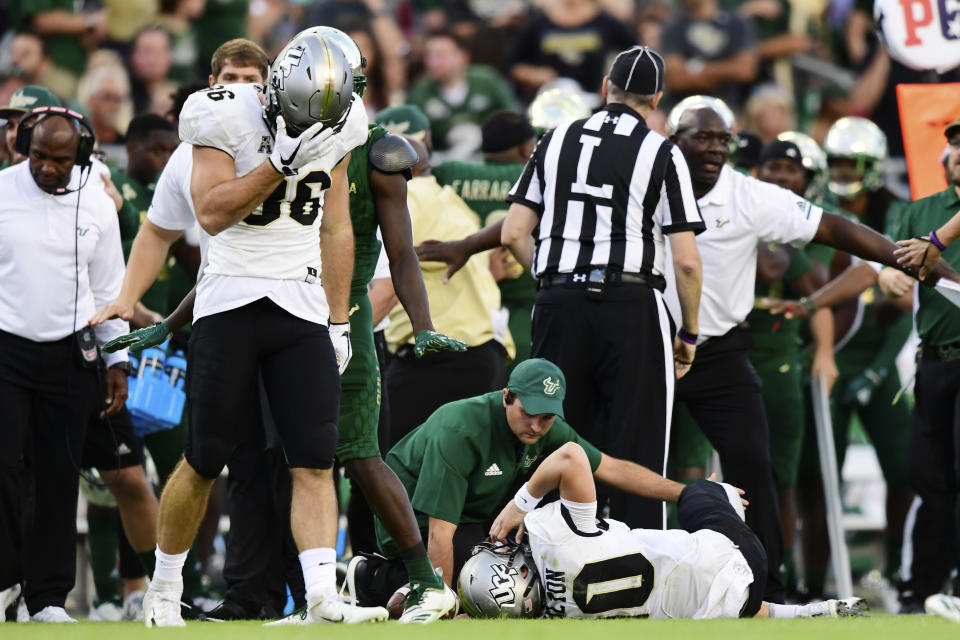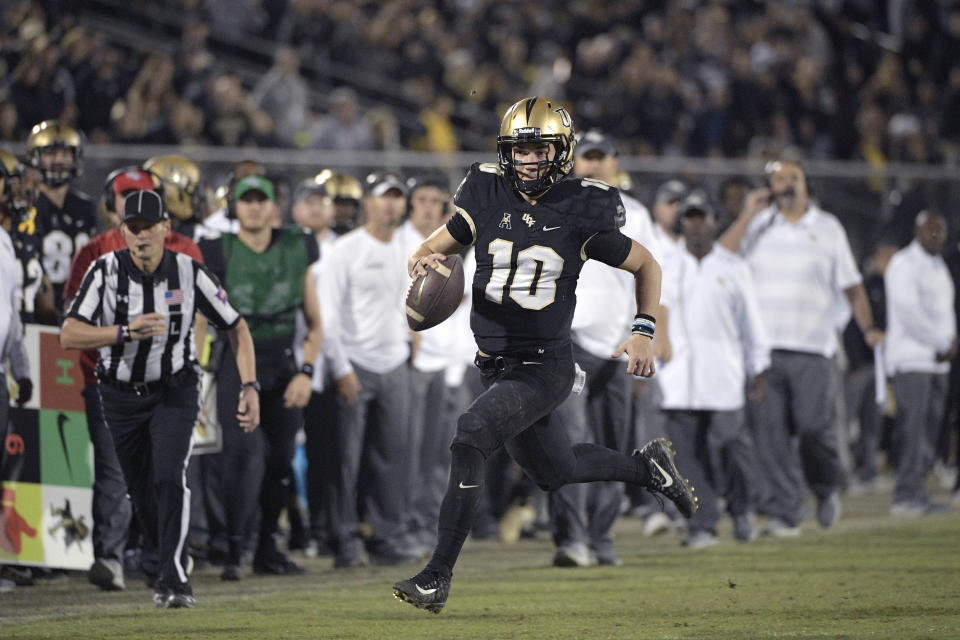Paradise lost: Why McKenzie Milton still strives to play football again after horrific injury
ORLANDO, Fla. — Teresa Milton watched the NBA Finals in June as a general sports fan, not emotionally invested in either the Golden State Warriors or the Toronto Raptors. But when she saw Kevin Durant come back from injury and get hurt again, she had a visceral reaction.
Milton went into her bedroom and cried, struck by a lightning bolt of clarity about her own son.
“I watched it and said to myself, ‘I get McKenzie now,’ ” she told Yahoo Sports.
The fourth of her four boys is McKenzie Milton, Central Florida quarterback. In a season flush with excellent college QBs, we are down a good man — the heart and soul of the Knights’ 2017-18 run will not play this year, still recovering from the horrific leg injury he suffered the day after Thanksgiving. But he dreams of playing football again, pushing himself through painful and tedious rehab, unwilling to limp away from the sport that broke him.
And now Teresa Milton understands why.
“He just keeps going,” she said. “I think he’s crazy, but I have to support him. He wants to come back for the love of the team. I watched the NBA Finals and I got it. I cried but I said, ‘Oh my God, he’s going to do it.’ ”
Wanting to do it and doing it are two different things, of course. Even nine months later, Milton’s road to full recovery remains daunting.

Last Saturday, he got out of a golf cart and walked with a noticeable hitch into the UCF stadium for an interview. The black brace and accompanying sleeve are still constant companions on his right leg, worn at all times except showering and sleeping and some rehab exercises. Through the sleeve you can see that the knee remains swollen, while the rest of his body is thin.
Milton has come a long way — farther than many doctors expected at this stage. Yet he's still a long way from playing shape, and longer still from being the crafty, dynamic quarterback who finished in the top 10 in Heisman Trophy voting each of the past two years while leading the Knights to 24 straight victories.
The simple act of running remains months in the distance — maybe January, doctors and trainers say. In the meantime UCF opens Thursday night against Florida A&M, so for the first time since first grade there will be a football season without him.
This is Milton’s paradise lost.
“There are good days and bad days, but I’ve never been woe is me,” he said. “I think it’s natural to question why things happen, until you see the fruit start to bear. When the good things start to happen, it’s easier. The support has come from around the country and that’s been awesome.
“I do believe something good is going to come out of this. I’m just trying to stay positive and keep working.”
‘I was probably in shock’
The play was a zone read to the right side of the line. It was early in the second quarter of the final game of the 2018 regular season, UCF at rival South Florida. The favored, No. 9-ranked and undefeated Knights were leading 7-0 and driving, their vaunted offense just getting untracked.
On a third-and-7 play, Milton took the snap and read the Bulls defensive end — if he stayed wide, the quarterback would hand off to the running back; if he crashed to the inside off the edge, he would pull the ball and keep it. The end crashed and Milton kept the ball, turning the corner on the right side of the line.
Then came the contact. The fateful physics of this particular collision were life altering.
There are worse things that can and have happened on the football field, hits that cause brain or spinal damage. But in terms of leg injuries, this was pretty far up the damage spectrum.
Defensive back Mazzi Wilkins came flying in with a low tackle, hitting Milton on the right knee and taking him down. Lying on his side, Milton’s hands went to his knee and his eyes looked briefly at the leg, then he laid back on the grass.
The knee had dislocated. His lower leg, encased in white tights and cleats, was hanging at a grotesquely unnatural angle. Everyone on the field and watching on TV could see very quickly that the injury was beyond the customary carnage of a violent sport.
“Not a lot of sound right then, not a lot of feeling in my leg,” Milton recalled, matter-of-factly. “I think it was adrenaline; I was probably in shock. Next thing I know the USF trainer is over me and then our trainer is over me, then our doctor is tugging on my knee, trying to pop it back in place.
“It didn’t hurt, I don’t remember the pain. Then [USF] Coach [Charlie] Strong was over me asking, ‘Milton, how you feeling?’ I was like, ‘Coach, not that great.’
“It was kind of a surreal moment. Everything happened very fast. It was crazy, but I never panicked. Both sidelines cleared and our guys were putting their hands on me, saying they loved me. Even the USF guys were doing that. I’m hesitant to use the word cool, but it was kind of a cool moment to see rival schools coming together like that.”

The USF and UCF football programs don’t like each other much, a pair of strivers less than two hours apart that are fighting for the same sliver of pie allotted to programs not in the Power Five conferences. Both have had periods of national prominence but still recruit outside the four- and five-star constellation of the bluebloods. Milton certainly fit that profile of a prospect, lightly regarded and undersized coming out of Hawaii.
Yet he became a star and led UCF to an epic shootout victory over USF in 2017, on the Knights’ way to the American Athletic Conference title, a Peach Bowl victory and a 13-0 record. Despite the pain of that loss, it’s easy to understand the respect the Bulls showed a year later in that moment, feeling for a battler of a quarterback who had just been laid low.
Milton has suffered plenty of injuries — he broke a foot early in his freshman year at UCF and played through it, wearing orthotics inside his old high school cleats. He knew this injury was bad, but he had no real knowledge how bad while he was on the field. The first inkling came when they loaded him into an ambulance.
“Normal knee injury, they’re not sending you to the hospital,” he said. “I started crying when I saw my mom in the hospital, then I was in surgery shortly thereafter.”
What he didn’t know: Doctors couldn’t initially find a pulse in his lower leg, indicating vascular damage in addition to the orthopedic trauma. And there was nerve damage as well. Amputation seemed a real possibility.
“I held his hand in the ER until they took him in the OR, but I did not know what was ahead,” Teresa Milton said. “After surgery they said, ‘We saved his leg,’ but there was still a chance over the next three-to-five days he could lose the leg. That was a rough few days.”
McKenzie found out none of that until after the anesthesia wore off. That’s when he was greeted by a jarring sight of thick metal rods in his leg. They would stay there for weeks.
Sitting in the UCF stadium, Milton reached for his phone and scrolled through post-op pictures. They show the rods outside the skin, drilled in to stabilize both the femur above the knee and the tibia below it — a major construction job that was just the start of repairing the damage. Looking at the picture nine months later, the quarterback sums it up in two words: “Pretty gnarly.”
On the inside of his upper left leg, Milton bears another long, thick scar. That’s where doctors removed a vein to rebuild the vascular supply line in his right leg. He still sees his vascular surgeon every three months for checkups, and will have to miss UCF’s opener to make an appointment in Tampa that day.
The nerve update, meanwhile, is promising. Milton said he’s nearly back to 100 percent in that area.
He’s put on cleats only occasionally to do some light, standstill throwing. No helmet, no shoulder pads since Nov. 23, 2018. The work ahead focuses on range of motion. He’s at 90 degrees of flexion at the moment, with the goal of reaching 130 — getting his foot back to his rear end, basically. Getting there will be painful and laborious.
But Milton has gained inspiration and support from former NFL tight end Zach Miller, who suffered a similar injury and navigated a long rehab process that ultimately led to his retirement earlier this year. And he connected with Alex Ruiz, a California QB who lost his lower right leg to amputation after an injury in high school.
Most important, though, has been the continuing bond with his teammates. A guy who plans to get an MBA but envisions a future as a coach is at every practice and meeting, offering what he can to Notre Dame transfer Brandon Wimbush and the rest of the UCF QBs.
“My best days have just been back in the locker room with the guys,” Milton said. “When I was laid up in my own room, it was tough. You’re just by yourself, in your own head. Being with people, that’s the best feeling.
“Sometimes it is a little frustrating seeing people who just had ACLs progressing much faster than me. But I know my injury isn’t normal, quote-unquote.”

What drives Milton to come back
Since he’s not yet cleared to drive, living with his parents in an off-campus apartment has helped. Mark and Teresa have spent a lot of time in Orlando since McKenzie first made the long trek from Hawaii for college, with Teresa establishing herself as the surrogate mother for the quarterbacks — her Hawaiian fried rice has received rave reviews. She still attends many practices (“I start cheering at practice”) and plans to be at almost every game this year.
Yet her love of the sport has butted up against an unfamiliar and unsettling new feeling — dread.
“I don’t know if I like football anymore,” Teresa said. “I’m scared now. It’s brutal. I like the NFL better because they at least get paid to take a beating.
“I support what he does. I don’t like it. I think it’s insane.”
McKenzie understands how she feels. But after nine months of rehab and with many months still ahead, the goal of putting on the helmet and playing the game he’s played since second grade remains strong within him.
“She’s OK if I never play again,” he said. “She’s protective of her youngest son, but she’s in full support. I know her and my dad get a lot of joy when I play, so that’s definitely more motivation for me to get back out there.
“None of this has made me think, ‘Why am I doing this? Why do I want to do this?’ I’ve never gotten to that point. If I’m physically not able to go at a level I want to, I won’t. I feel like that would be a disservice to myself. But I think I can get back to my old self, maybe a little better.”
That would be Milton’s paradise regained.
More from Yahoo Sports:

 Yahoo Sports
Yahoo Sports 